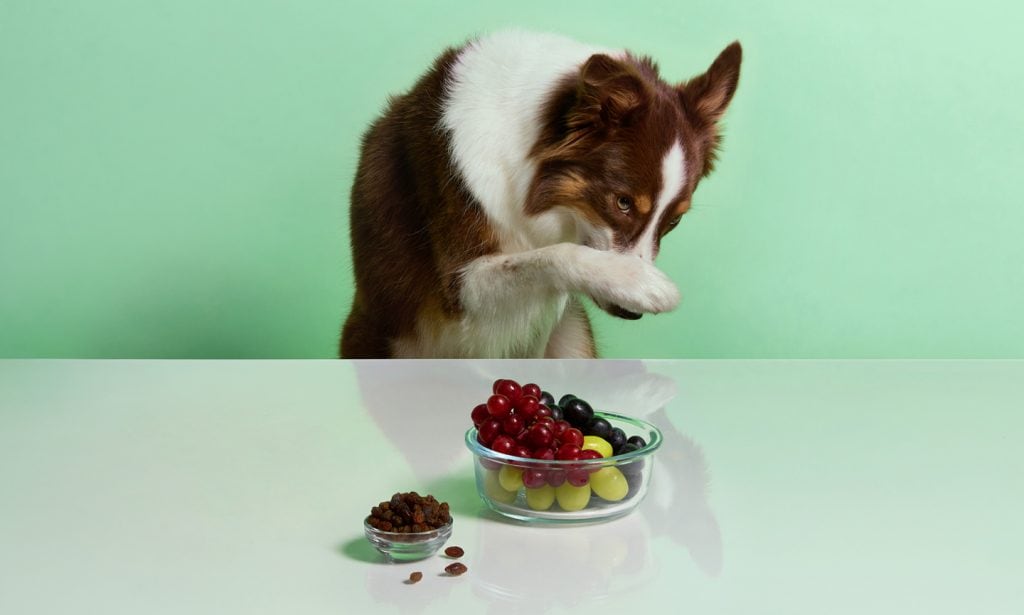A dog should not eat any raisins as they can be toxic to dogs. Raisins can cause kidney failure in dogs. If a dog accidentally consumes raisins, it is important to seek immediate veterinary attention.
Raisins may be a tasty and nutritious snack for humans, but they can have severe consequences if ingested by dogs. While some fruits are safe for dogs to eat in moderate amounts, raisins should never be included in their diet.
The reason behind this caution is that raisins have been found to be highly toxic to dogs, potentially leading to kidney failure or other serious health complications. Even a small amount of raisins can be harmful to our furry friends, so it is crucial to keep all raisin-containing products, such as raisin bread, cookies, or trail mix, out of reach from pets. In case of accidental consumption, rapid veterinary intervention is essential to minimize any potential harm. Let’s explore in further detail why raisins pose such a risk to our canine companions.

Credit: be.chewy.com
Are Raisins Safe For Dogs?
Raisins may pose potential risks to dogs if consumed. Symptoms of raisin toxicity in dogs can include vomiting, diarrhea, and decreased appetite. It’s important to note that even a small amount of raisins can be harmful to dogs, and the severity of the reaction can vary.
If you suspect that your dog has ingested raisins or is showing signs of raisin toxicity, it’s crucial to seek veterinary attention immediately. Raisins contain substances that can be toxic to dogs, potentially leading to kidney damage or failure. As a responsible pet owner, it’s best to avoid feeding your dog raisins or any foods containing raisins to ensure their safety and well-being.
Always consult a veterinarian for guidance on what foods are safe for your dog to consume.
Understanding The Quantity Limitations For Dogs
Determining the safe limit for a dog’s raisin consumption depends on various factors. These factors include the dog’s size, weight, and overall health condition. It is crucial to note that raisins can be toxic to dogs and may lead to kidney failure.
Therefore, it is recommended to avoid feeding them raisins altogether. Even a small quantity can pose a risk to your furry friend’s well-being. Instead, opt for dog-friendly treats and snacks that are specifically formulated for their dietary needs. Always consult with your veterinarian before introducing any new food item into your dog’s diet.
They will be able to provide you with tailored advice based on your dog’s individual needs and help you make informed decisions regarding their nutrition. Keep your dog safe and healthy by choosing their snacks wisely!
Safe Alternatives To Raisins
Raisins are a big no for dogs, but don’t worry, there are safe alternatives to consider. If you are looking for nutritious alternatives to raisins for your dog, you have options. Fruits and vegetables can be a great addition to their diet.
Apples are a popular choice, but make sure to remove the seeds and core. Blueberries are also a safe and delicious option. Carrots are crunchy and packed with vitamins, while bananas provide a good source of potassium. Just remember to always introduce new foods gradually and in moderation.
Your furry friend will appreciate the variety and you can rest easy knowing they are enjoying a safe treat.
Monitoring And Preventing Accidental Ingestion
Accidental ingestion of raisins can be dangerous for dogs. To prevent this, monitoring is crucial. Keep raisins out of your dog’s reach and ensure that they cannot access them accidentally. It’s important to also be aware of the signs of raisin toxicity in dogs, such as vomiting, diarrhea, and decreased appetite.
Should your dog accidentally eat raisins, take immediate action. Call your veterinarian for guidance and provide them with important details such as the quantity ingested and your dog’s weight. Treatment may involve inducing vomiting or administering activated charcoal to prevent absorption of toxins.
Monitoring your dog closely and seeking prompt veterinary care is essential in protecting your pet from the potential dangers of raisin ingestion.
Conclusion
It is essential to understand the potential dangers of feeding raisins to dogs. Raisins can be toxic and lead to serious health issues such as kidney failure. Even a small amount can be harmful, so it is crucial to keep raisins out of your dog’s reach.
If you suspect that your dog has ingested raisins, it is important to seek immediate veterinary care. Remember that prevention is the best approach when it comes to your furry friend’s well-being. Stick to a balanced and nutritionally appropriate diet for your dog, and always consult with your veterinarian before introducing any new foods or treats.
By being aware of the risks, you can ensure your dog’s safety and provide them with a healthy, happy life.
